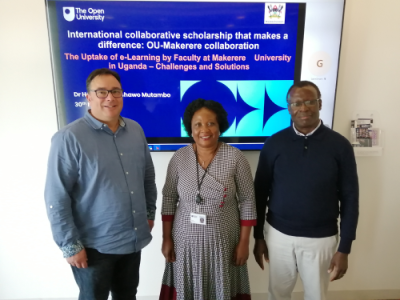Taking an international collaboration in higher education forward

Building on previous collaboration-based projects between the Faculty of Business and Law (FBL) at The Open University (OU) in the UK and the Institute of Open, Distance and e-Learning (IODeL) at Makerere University in Uganda, the year 2024 has seen the collaboration being taken a notch higher.
This was a result of a visit to the faculty by an OU International Fellow – Dr Harriet Nabushawo, who is based at IODeL. Following the many interruptions caused by the recent pandemic, Harriet was one of the first international fellows the faculty was hosting in person after a post-pandemic review of the fellowship programme to make it more robust for the future.
After many virtual engagements between Harriet and her colleagues in Uganda and her collaboration partners in FBL, led by Dr Charles Mbalyohere (Senior Lecturer in Strategic Management), the two-week face-to-face visit provided an opportunity to experience the collaboration differently and to enhance some of its qualitative aspects. Finding the optimal mix between virtual and face-to-face collaboration was a discovery journey affected by many factors, including there being generally limited opportunities for the latter form of collaboration in this instance. The two weeks hence naturally translated into an effort to extract as much value as possible from the opportunity.
Both sides recognised early that there is lots they can learn from each other (Lubicz-Nawrocka, 2023). Consequently, a co-owned partnership based on equal roles and shared engagement has emerged, leading to mutual benefit. As such international collaborations in the higher education sector become ever more important in the pursuit of cross-cultural exchanges between students and staff, case studies in how to effectively structure the collaborations will also become more important (Altback & Knight, 2007; Hackett et al., 2023). The collaborations are also increasingly seen as a testing ground for calls to dismantle neo-colonial mindsets and assumptions that created inequalities in partnerships between institutions in the global north and south.
A focus for the visit was developing a shared understanding of strategies to improve the quality of online-based teaching and learning in the aftermath of the pandemic. While the pandemic found the OU in a generally enviable position of already using a widely-tested Open and Distance Learning model, other institutions like Makerere University had to go to extremes to adapt to the situation. Dr Harriet Nabushawo gave her hosts a firsthand insight into how her institution dealt with the global emergency and what has been done to draw lessons and help staff to acquire the needed skills. But because the OU is a learning organisation too, for example with regards to attracting and supporting international students based in emerging countries, there was room to share experiences and co-create new knowledge. Importantly, there was also room for the FBL team to constructively contribute to developing potential solutions.
This final point about contributing to potential solutions resonates with ongoing endeavours to sharpen the international strategy in the faculty and the wider university. Collaborations with international partners like Makerere University offer the OU an opportunity to explore the possibilities out there and how they can be exploited using equitable, just and dynamically-structured partnerships. A collaboration with another Uganda-based institution, Uganda Management Institute, has been deployed on the MBA programme to enable the joint hosting of an international tutorial. This has enabled students from both institutions to experience cross-cultural engagement with their peers and consequently enhance their learning about internationalisation. The project is now set to host a third international partner, this time from India, thus opening the door for an even more diverse and geographically-distributed collaborative experience. In light of the OU’s plans to be more pro-active in engaging internationally, such jointly hosted teaching and learning events are poised to become more strategically important.
To crown her visit, Dr Nabushawo made a presentation on ‘The Uptake of e-Learning by Faculty at Makerere University in Uganda – Challenges and Solutions’ to a hybrid audience of listeners at campus and online. The ensuing discussions enhanced the collaborative engagement surrounding her visit. There was a prior presentation by Dr Mbalyohere on ‘Insights from student views on employability-entrepreneurship-enhancing strategies: a case study of a Uganda-based university’, summarising findings from one of the other projects between the two institutions. The two presentations were followed by a plenary session facilitated by Prof Dev Kodwani, to explore the prospects for strengthening such collaborations and integrating them in our international strategy.
In conclusion, the visit helped strengthen the partnership between FBL and Makerere University. It gave indications of how virtual collaboration can be complimented with limited face-to-face opportunities for a much more dynamic outcome. There were also some elements in the interaction that reflected the potential for developing more equitable and balanced collaborations based on shared values and aspirations. As the two institutions take the collaboration to new levels, there is room to explore other areas of engagement where the experiences thus far can be deepened.
Figure description, from left to right: Dr Matthew Higgins, Head of Department for Strategy and Marketing, The Open University Dr Harriet Nabushawo, Open University International Fellow, Makerere University Dr Charles Mbalyohere, Senior Lecturer in Strategic Management, The Open University.
References
Altbach, P. G., & Knight, J. (2007). The internationalization of higher education: Motivations and realities. Journal of studies in international education, 11(3-4), 290-305.
Hackett, S., Janssen, J., Beach, P., Perreault, M., Beelen, J., & Van Tartwijk, J. (2023). The effectiveness of Collaborative Online International Learning (COIL) on intercultural competence development in higher education. International Journal of Educational Technology in Higher Education, 20(1), 5.
Lubicz-Nawrocka, T. (2023). Conceptualisations of curriculum co-creation: ‘it’s not them and us, it’s just us’. Curriculum Perspectives, 43(1), 25-37.

Blog posts
- Rethinking Tuition: Reflections from the Staff Tutor / Student Experience Manager (SEM) Symposium, 4-5 December 2024 6th June 2025
- ‘Hitting the keyboard’ : Exploring student feelings and approaches to developing legal research skills 9th May 2025
- From Feedback to Action: The Student Voice Festival in Law Education 15th April 2025
